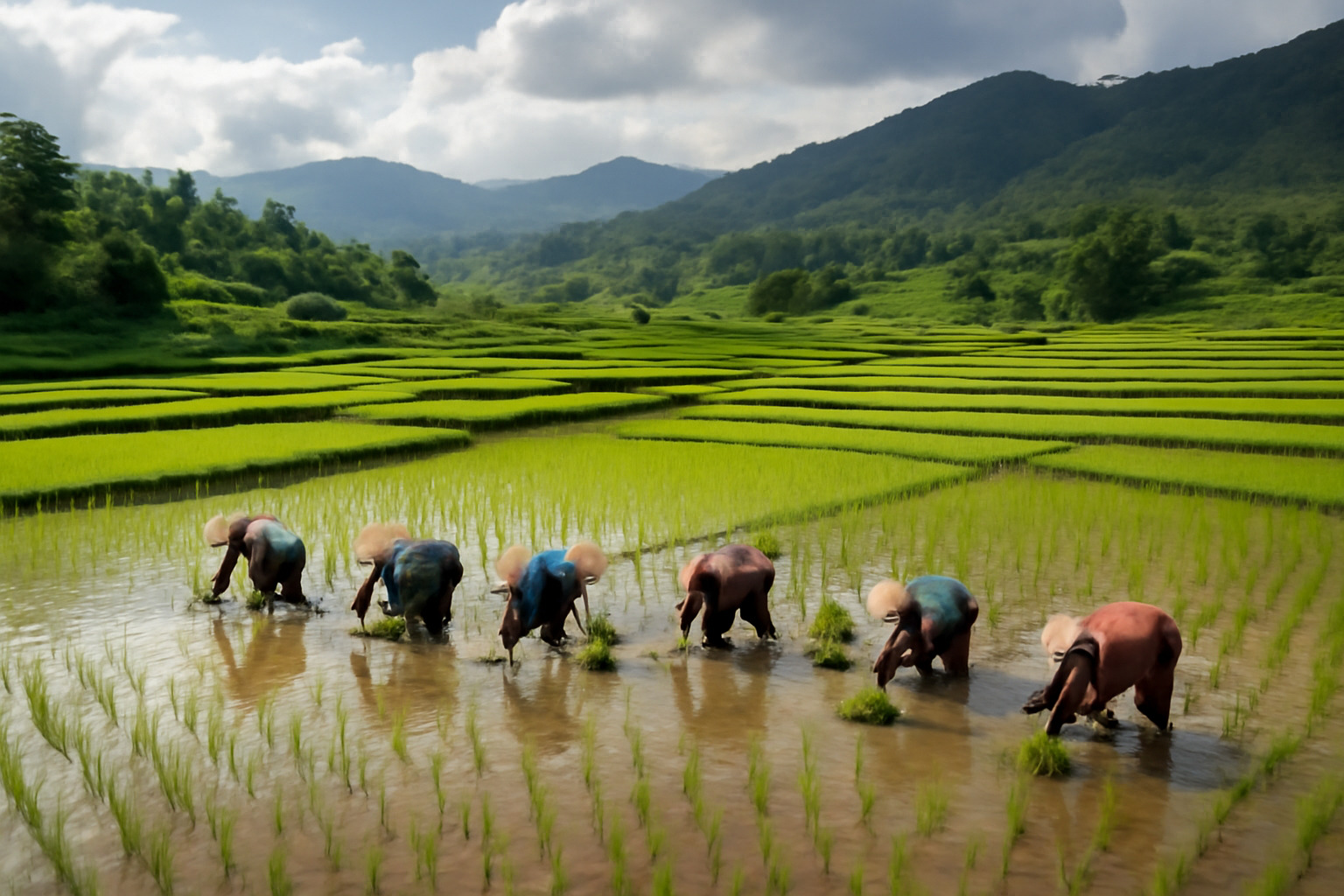<> Viral of Today <>
Home » TOURISM NEWS » Hotel Indigo Seminyak Beach’s Rice Farming Program for a Unique Eco-Tourism Experience in Mengwi, Indonesia Wednesday, June 4, 2025As travelers continue to seek more authentic, immersive experiences, a new wave of purpose-driven tourism is gaining momentum. Among the most compelling and enriching experiences are those that provide hands-on engagement with local communities, especially in rural areas where time-honored traditions are at risk of disappearing. Rice farming, a centuries-old practice central to the cultures of many Asian countries, is increasingly becoming a key focus for travelers eager to support local economies while gaining an understanding of the heritage that sustains these communities. This type of travel, known as rural upskilling, offers tourists the opportunity to participate in agricultural activities that are as culturally significant as they are educational. From the rice fields of Bali to the rural villages of Japan, these programs invite travelers to get their hands dirty while helping preserve a vital piece of agricultural history.In this article, we’ll explore how rice farming tourism is reshaping the concept of voluntourism, offering both travelers and communities a chance to thrive. Hotel Indigo Bali Seminyak Beach and Walk Japan’s Community Project are just two examples of organizations spearheading this transformation. Through active participation, travelers not only gain a deeper appreciation for local culture but also contribute to sustaining traditional practices that are crucial for both the people and the environment.The Evolution of Purpose-Driven TravelIn recent years, travelers have increasingly gravitated towards experiences that are more meaningful, often seeking destinations that offer a blend of cultural immersion, volunteerism, and eco-consciousness. This shift is partly driven by the desire to make a positive impact while traveling. Rural upskilling, a term that encapsulates the exchange of knowledge and skills between travelers and locals, is at the forefront of this trend. By participating in activities such as rice farming, visitors gain firsthand insight into the agricultural practices that have sustained societies for centuries.The key appeal of these experiences lies in their authenticity. Instead of being passive consumers of a destination, tourists become active participants, contributing directly to the preservation of traditional farming and the empowerment of local communities. Volunteer tourism, or voluntourism, has also evolved. Today, it’s about more than just donating time or money—it’s about learning and engaging in ways that have long-lasting impacts.Why Rice Farming? The Cultural SignificanceRice is not merely a staple food; it is deeply woven into the cultural fabric of many Asian societies. For thousands of years, rice farming has been central to the way of life in countries like Indonesia, Japan, and China. The process of cultivating rice is labor-intensive and highly ritualized, often involving ceremonies and festivals that celebrate the harvest and honor the land. In fact, the importance of rice in these cultures can be seen in practices such as Japan’s reverence for the Seven Gods of Fortune, which are symbolized in every grain of rice, and the Chinese New Year celebration, where rice plays a central role in offering thanks for abundance and prosperity.However, as generations pass, fewer young people are willing to take up rice farming, and traditional knowledge is at risk of being lost. Many farmers, particularly in rural regions, are aging, and the younger population is moving to urban areas, seeking better opportunities. This shift threatens not only the farming community’s livelihood but also the sustainability of their culture. Tourists stepping into the field can help reverse this trend, offering much-needed assistance while learning about the vital role rice farming plays in local economies and societies.Rice Farming Programs: Experiencing Rural AsiaSeveral organizations are now offering immersive rice farming experiences to travelers. These programs give tourists the chance to work directly alongside local farmers, helping with tasks such as planting, maintaining, and harvesting rice. While these hands-on experiences are labor-intensive, they also provide travelers with a deeper understanding of agricultural practices and rural life.Hotel Indigo Bali Seminyak Beach: Reviving Local Rice FieldsHotel Indigo Bali Seminyak Beach has created a unique experience for guests to engage in traditional Balinese rice farming through a program that brings together hotel staff, local farmers, and tourists in the Mengwi area of Bali. This program isn’t just about cultivating rice; it’s about building relationships and contributing to the local community’s welfare. In collaboration with the farmers, guests participate in every step of the rice-growing process—from planting to harvesting. The rice produced from this project is donated to local orphanages and foundations, helping address food insecurity in the region.Key Highlights of the Program:Hands-on participation in planting, maintaining, and harvesting rice.Cultural immersion, learning about traditional Balinese farming practices.Impactful outcomes, with rice donations benefiting local Balinese orphanages.A sustainable tourism model that supports local farmers and preserves agricultural traditions.In 2025, Hotel Indigo’s rice farming program produced 300kg of rice, which was distributed to Balinese orphanages, demonstrating the program’s tangible impact. The project highlights how tourism can be a force for good, allowing travelers to directly contribute to local communities while fostering cultural preservation.Walk Japan: Preserving Japanese Rural TraditionsWalk Japan, known for pioneering off-the-beaten-path walking tours across Japan, has incorporated a Community Project that invites travelers to participate in rural Japanese traditions, including rice farming. As part of its small-group tours across the country, Walk Japan offers participants the chance to engage in community service, such as helping elderly farmers with rice planting or harvesting.This initiative is not just about helping with farm tasks; it’s about strengthening connections between travelers and rural communities. Through the program, tourists get to experience firsthand the wisdom passed down through generations, ensuring that these traditional skills continue to thrive in modern times. The Japanese approach emphasizes mutual respect, with travelers gaining valuable skills and knowledge while contributing to a community that is facing unique challenges.Key Features of Walk Japan’s Community Project:Intimate, small-group tours that foster genuine connections with locals.Hands-on involvement in rural activities like rice planting and harvesting.Cultural exchange, where travelers learn from local farmers about the techniques and values that have sustained Japanese rice farming for centuries.Contributing to the preservation of rural communities as farmers age and local populations decline.The Future of Rice Farming TourismAs the demand for purpose-driven travel continues to grow, the future of rice farming tourism looks bright. More hotels, tour companies, and non-profits are likely to adopt similar models, offering travelers the chance to learn, volunteer, and connect with rural communities in ways that were previously unimaginable. The impact of these programs goes beyond tourism—it’s about empowering communities, preserving traditions, and ensuring that the practices that have sustained cultures for millennia remain alive for future generations.ConclusionThe intersection of purpose-driven travel and cultural preservation is a powerful force, especially when it involves hands-on activities like rice farming. Programs offered by organizations like Hotel Indigo Bali Seminyak Beach and Walk Japan provide travelers with the unique opportunity to contribute to the preservation of agricultural heritage, help local farmers, and immerse themselves in cultural practices that are thousands of years old. These experiences are not just about sightseeing or passive observation; they are about active participation and making a tangible difference in the world. As travelers continue to seek more meaningful connections with the destinations they visit, it is clear that rice farming tourism will remain an important part of the global travel landscape, offering a glimpse into the past while ensuring a sustainable future for rural communities.Tags: Asia, Asia tourism news, Bali rice farming, Bali Tourism News, Hotel Indigo Bali Seminyak Beach, indonesia, Indonesia Tourism News, japan, Japan Tourism news, Japanese rice farming, Mengwi, Travel News, Walk Japan
This information will surprise you!
See also
- Read until the end to discover everything.
- Important information you need to know.
- Interesting facts and helpful tips.
Conclusion
Did you enjoy the news? Keep following us daily!

